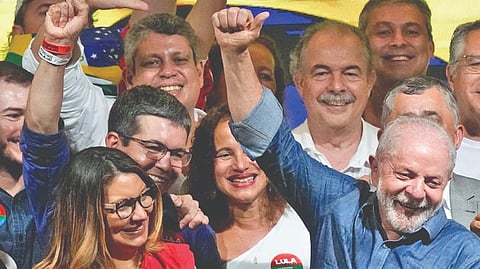

WASHINGTON: When supporters of Jair Bolsonaro wake up after a raucous New Year’s Eve party, they might not only face a hangover. They could, in fact, be confronted with a veritable nightmare: Luiz Inacio Lula da Silva, the man who they claim plans to ban churches and feels drawn to Satanists, this “godless communist,” will be sworn in as Brazil’s new president on January 1, 2023. But is there any truth to these accusations? Will 77-year-old Lula, who founded Brazil’s Workers’ Party, the Partido dos Trabalhadores (PT) and served as president from 2003 to 2011, try to introduce communism when he returns to office in 2023?
This is a prospect Fernando Morais finds unthinkable. “Lula was never a communist, and he will never be one. Throughout his life, he never had any ties to the Communist Party.” Few people in Brazil know Lula as well as Morais. The writer has known Lula for about 50 years. He knew him when Lula was still a simple factory worker. He has also written a noteworthy biography about the former president, who is about to return to power.
On the evening before Lula was arrested for alleged corruption in 2017, Morais asked him whether he was a communist at heart. To which Lula drily replied: “There were half a million workers behind me in 1980 and I prevented a strike. I would have started a revolution if I had been a communist. But what did I do instead? I founded a party and trade union headquarters.”
In 1975, Lula was elected as head of the Metal Workers’ Union. Five years later, Lula founded the Workers’ Party. After the end of Brazil’s military junta (which ruled from 1964 to 1985), Lula became a delegate in the constitutional assembly of the Brazilian Congress in 1987. Bolsonaro supporters keep drawing attention to this period in Lula’s career, before his mercurial political rise, when Lula expressed admiration for the Cuban government and openly criticised the Brazilian military regime, which jailed him for five weeks in 1980.
“Lula’s older brother Frei Chico tried to get Lula to join the Communist Party on several occasions. He had the opportunity to work for a clandestine Marxist organisation, too. But he [Lula] never wanted that,” says Morais. “Lula said anyone who wants to listen to him [speak] should join the union, as he would not speak on street corners, but in front of thousands in stadiums.”
Since becoming a politician, Lula’s positions have become increasingly centrist. He would probably be a good fit for Germany’s centre-left Social Democratic Party (SPD). It’s little wonder, then, that Lula was a personal friend of the late German Chancellor Helmut Schmidt, who was a Social Democrat. During his time as president, Lula enacted liberal economic policies. At the same time, his government funnelled considerable funds into social programs like the Zero Hunger initiative. When he enacted an ambitious program to reform social insurance in 2003, Lula removed far-left members from his party who refused to vote on the measure. Not only that. Brazilian banks and major companies recorded record profits during Lula’s reign.
Fernando Morais says Lula “announced he will resign from the presidency only when each and every Brazilian has three meals a day: breakfast, lunch and dinner. He will continue what he has worked towards in the past: to end hunger. Lula no longer needs to prove he is the opposite of a communist.”
Even so, many people in Brazil are frightened by the idea of communism — not unlike in the US, where the Republicans have been accusing Democrats of communist tendencies for decades. Why is it that merely mentioning Cuba, Nicaragua and Venezuela stokes such strong antipathy among centre-right Brazilians? And how is it possible that Lula, who governed the country of 271 million for eight years, implementing successful political and economic policies, is still branded a communist?
Visit news.dtnext.in to explore our interactive epaper!
Download the DT Next app for more exciting features!
Click here for iOS
Click here for Android